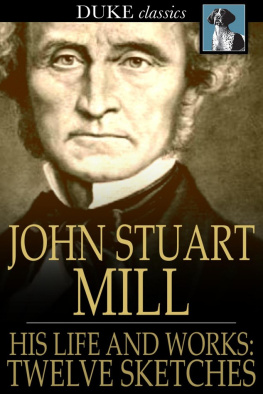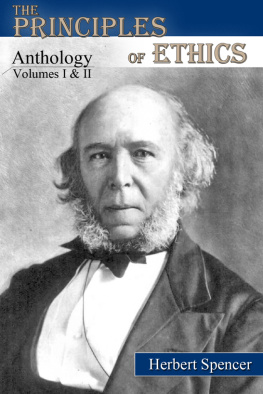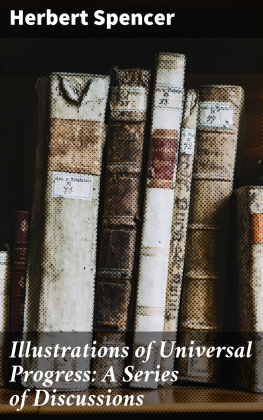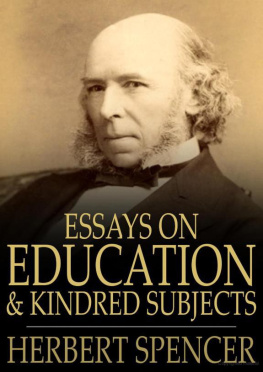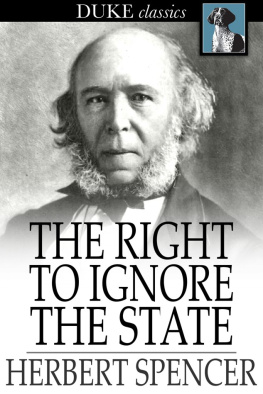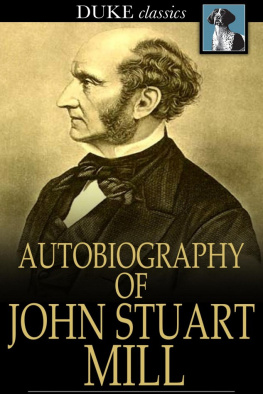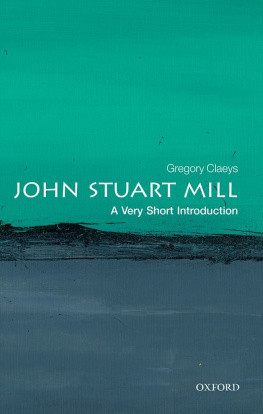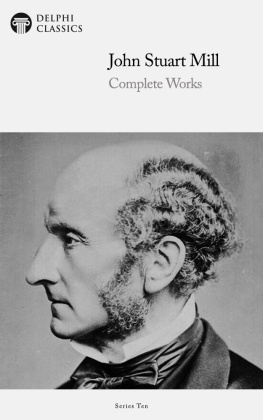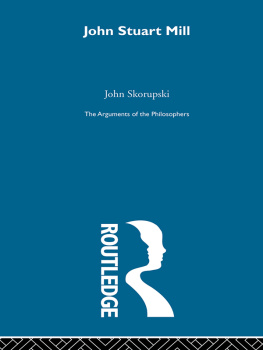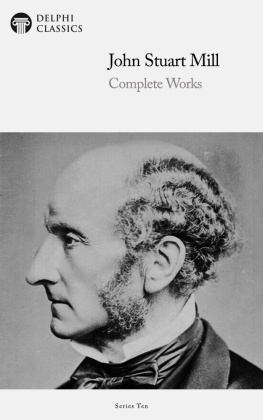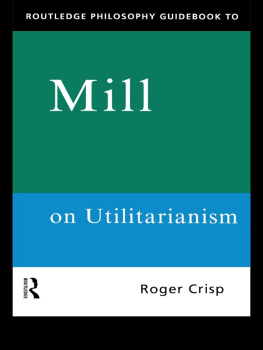JOHN STUART MILL
HIS LIFE AND WORKS, TWELVE SKETCHES BY DISTINGUISHED AUTHORS
* * *
VARIOUS
*
John Stuart Mill
His Life and Works, Twelve Sketches by Distinguished Authors
From an 1873 edition
ISBN 978-1-62011-191-8
Duke Classics
2012 Duke Classics and its licensors. All rights reserved.
While every effort has been used to ensure the accuracy and reliability of the information contained in this edition, Duke Classics does not assume liability or responsibility for any errors or omissions in this book. Duke Classics does not accept responsibility for loss suffered as a result of reliance upon the accuracy or currency of information contained in this book.
Contents
*
I - A Sketch of His Life by H. R. Fox Bourne
*
John Stuart Mill was born on the 20th of May, 1806. "I am glad," wroteGeorge Grote to him in 1865, with reference to a forthcoming articleon his "Examination of Sir William Hamilton's Philosophy," "to get anopportunity of saying what I think about your 'System of Logic' and'Essay on Liberty,' but I am still more glad to get (or perhaps tomake) an opportunity of saying something about your father. It hasalways rankled in my thoughts that so grand and powerful a mind as hisleft behind it such insufficient traces in the estimation ofsuccessors." That regret was natural. The grand and powerful mind ofJames Mill left very notable traces, however, in the philosophicalliterature of his country, and in the training of the son who was tocarry on his work, and to be the most influential teacher in a newschool of thought and action, by which society is likely to berevolutionized far more than it has been by any other agency sincethe period of Erasmus and Martin Luther. James Mill was something morethan the disciple of Bentham and Ricardo. He was a profound andoriginal philosopher, whose depth and breadth of study were all themore remarkable because his thoughts were developed and his knowledgewas acquired mainly by his own exertions. He had been helped out ofthe humble life into which he had been born by Sir John Stuart, whoassisted him to attend the lectures of Dugald Stewart and others atEdinburgh with a view to his becoming a minister in the Church ofScotland. Soon finding that calling distasteful to him, he had, in ornear the year 1800, settled in London as a journalist, resolved byephemeral work to earn enough money to maintain him and his family inhumble ways while he spent his best energies in the more seriouspursuits to which he was devoted. His talents soon made him friends,and the greatest of these was Jeremy Bentham.
As erroneous opinions have been current as to the relations betweenBentham and James Mill and have lately been repeated in more than onenewspaper, it may be well here to call attention to the contradictionof them that was published by the son of the latter in "The EdinburghReview" for 1844. "Mr. Mill and his family," we there read, "livedwith Mr. Bentham for half of four years at Ford Abbey,"that is,between 1814 and 1817,"and they passed small portions of previoussummers with him at Barrow Green. His last visit to Barrow Green wasof not more than a month's duration, and the previous ones alltogether did not extend to more than six months, or seven at most.The pecuniary benefit which Mr. Mill derived from his intimacy withBentham consisted in this,that he and his family lived with him ashis guests, while he was in the country, periods amounting in all toabout two years and a half. I have no reason to think that hishospitality was either given or accepted as pecuniary assistance, andI will add that the obligation was not exclusively on one side.Bentham was not then, as he was afterwards, surrounded by persons whocourted his society, and were ever ready to volunteer their services,and, to a man of his secluded habits, it was no little advantage tohave near him such a man as Mr. Mill, to whose advice and aid hehabitually had recourse in all business transactions with the outwardworld of a troublesome or irksome nature. Such as the connection was,it was not of Mr. Mill's seeking." On the same unquestionableauthority we learn, that "Mr. Mill never in his life was in debt, andhis income, whatever it might be, always covered his expenses." It isclear, that, from near the commencement of the present century, JamesMill and Bentham lived for many years on terms of great intimacy, inwhich the poorer man was thoroughly independent, although it suitedthe other to make a fair return for the services rendered to him. Avery characteristic letter is extant, dated 1814, in which James Millproposes that the relations between him and his "dear friend andmaster" shall be to some extent altered, but only in order that theircommon objects may be the more fully served. "In reflecting," he says,"upon the duty which we owe to our principles,to that system ofimportant truths of which you have the immortal honor to be theauthor, but of which I am a most faithful and fervent disciple, andhitherto, I have fancied, my master's favorite disciple,I haveconsidered that there was nobody at all so likely to be your realsuccessor as myself. Of talents it would be easy to find manysuperior. But, in the first place, I hardly know of anybody who has socompletely taken up the principles, and is so thoroughly of the sameway of thinking with yourself. In the next place, there are very fewwho have so much of the necessary previous discipline, my antecedentyears having been wholly occupied in acquiring it. And, in the lastplace, I am pretty sure you cannot think of any other person whosewhole life will be devoted to the propagation of the system." "Therewas during the last few years of Bentham's life," said James Mill'sson, "less frequency and cordiality of intercourse than in formeryears, chiefly because Bentham had acquired newer, and to him moreagreeable intimacies, but Mr. Mill's feeling never altered towardshim, nor did he ever fail, publicly or privately, in giving due honorto Bentham's name and acknowledgment of the intellectual debt he owedto him."
Those extracts are made, not only in justice to the memory of JamesMill, but as a help towards understanding the influences by which hisson was surrounded from his earliest years. James Mill was living in ahouse at Pentonville when this son was born, and partly because of thepeculiar abilities that the boy displayed from the first, partlybecause he could not afford to procure for him elsewhere such teachingas he was able himself to give him, he took his education entirelyinto his own hands. With what interesteven jealous interest, itwould seemBentham watched that education, appears from a pleasantlittle letter addressed to him by the elder Mill in 1812. "I am notgoing to die," he wrote, "notwithstanding your zeal to come in for alegacy. However, if I were to die any time before this poor boy is aman, one of the things that would pinch me most sorely would be thebeing obliged to leave his mind unmade to the degree of excellence ofwhich I hope to make it. But another thing is, that the only prospectwhich would lessen that pain would be the leaving him in your hands. Itherefore take your offer quite seriously, and stipulate merely thatit shall be made as soon as possible; and then we may perhaps leavehim a successor worthy of both of us." It was a bold hope, but onedestined to be fully realized. At the time of its utterance, the "poorboy" was barely more than six years old. The intellectual powers ofwhich he gave such early proof were carefully, but apparently notexcessively, cultivated. Mrs. Grote, in her lately-published "PersonalLife of George Grote," has described him as he appeared in 1817, theyear in which her husband made the acquaintance of his father. "JohnStuart Mill, then a boy of about twelve years old,"he was reallyonly eleven,"was studying, with his father as sole preceptor, underthe paternal roof. Unquestionably forward for his years, and alreadypossessed of a competent knowledge of Greek and Latin, as well as ofsome subordinate though solid attainments, John was, as a boy,somewhat repressed by the elder Mill, and seldom took any share in theconversation carried on by the society frequenting the house." It isperhaps not strange that a boy of eleven, at any rate a boy who was tobecome so modest a man, should not take much part in generalconversation; and Mr. Mill himself never, in referring to his father,led his hearers to suppose that he had, as a child, been in any wayunduly repressed by him. The tender affection with which he alwayscherished his father's memory in no way sanctions the belief that hewas at any time subjected to unreasonable discipline. By him hisfather was only revered as the best and kindest of teachers.

